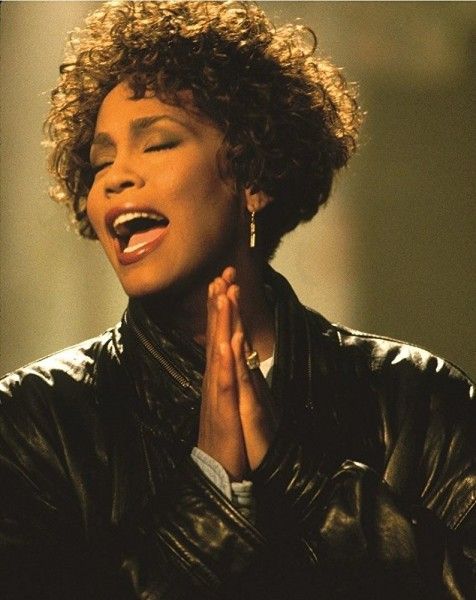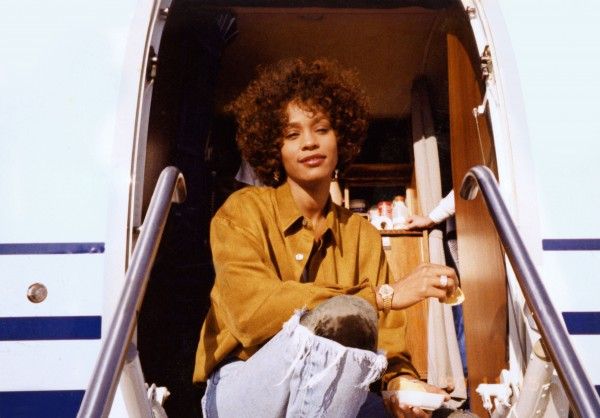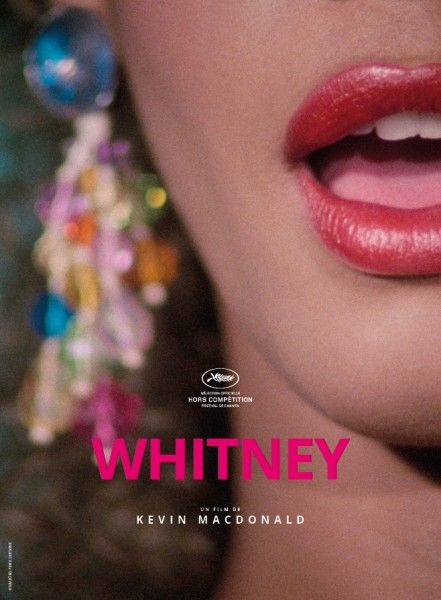It’s somewhat rare in this day and age that a highly anticipated documentary can create something of a news breaking bombshell but that’s the case with Whitney, which debuted as a midnight screening early Thursday morning at the 71st Festival de Cannes. The Kevin Macdonald directed doc focuses on the life of pop icon Whitney Houston who died at the age of 48 in 2012. What caused her long downward spiral has only been speculated in the media, even when it was happening in the public view. Now, in this new film, family members have revealed a secret that may help put the puzzle of her tragic life together.
As much of the public is aware, Whitney suffered from drug addictions for a good portion of the last two decades of her life. It was always unclear what exactly prompted this to become a genuine problem. Was it pressure to financially support her family? Probably. Was it exacerbated with a co-dependent and flawed marriage to Bobby Brown? Without question. Privately, however, it appears Houston was dealing with the long-term effects of being sexually abused as child by Dee Dee Warwick, her cousin and the sister of another music legend, Dionne Warwick. These accusations are made in the documentary by Houston’s brother, Gary Houston, who also says he was abused by Dee Dee and reiterated by Pat Houston, Whitney’s sister-in-law. Whitney Houston’s aunt, Mary Jones, says Houston also told her she was abused and who was responsible for it. Jones is also the person who found Houston unresponsive in her Beverly Hills Hotel room on Feb. 11, 2012.
Dee Dee passed away of complications due to drug abuse in 2008. And Macdonald never reveals if anyone from her side of the family would comment on the allegations.
That revelation though is just the beginning of what the Oscar-winning filmmaker finds out in an investigation where he says he spoke to around 70 people. The new trailer for Whitney has a cringe-worthy title card that says, “The Questions You Want Asked,” but it’s hard to argue that with this doc meaningful answers aren’t provided.
The film begins spending a good deal of time exploring Houston’s childhood. She was the youngest of three and her mother Cissy Houston was a well-known singer and backup vocalist, most notably to Aretha Franklin. Her father, John Houston, was a civil servant who worked for the first African-American mayor of Newark, N.J. Her mother spent much of her time on the road earning money to give her kids a better life while her father was part of one of the most corrupt administrations in the city’s history (which meant it was a lucrative gig). Because their parents were so busy, the three Houston siblings were raised by different sets of relatives. Where Dee Dee entered the picture is unclear, but if the allegations are true it only made inflamed a rough childhood where Whitney was constantly bullied by other kids over her light skin and clashed with a strict mother who was in and out of the picture.
One thing Houston knew she could do is sing and by 18 she’d moved out on her own to pursue a professional recording career. She was sidetracked into modeling, but eventually, with her mother’s guidance, she found herself in a bidding war for a record contract. She signed with Arista and within a few years started a string of seven no. 1 singles. But Macdonald really only has time for an overview of her career as Whitney’s personal life was ripe with contradictions and secrets.
Houston had moved in with Robyn Crawford when she first was left home. Years later Crawford became the target of tabloid speculation as Houston’s lesbian lover. Crawford did act as Whitney’s creative contact with the record studios, but their personal relationship was complicated. One family members says Houston wasn’t gay, she just could love everyone. Does that mean she was Bi? Was she hiding her true sexuality for years in a marriage where she thought she was in love with Brown, but still dealing with her abuse? Was she actually gay and never comfortable in her own skin? The movie has no easy answers but at least tries to paint more of a picture than has been rationally discussed before.
Even with Whitney’s marriage to Brown, Crawford stayed in the picture as she was the only person who could get her friend out of bed and ready for the stage. Crawford eventually lost a power struggle with Houston’s husband, however, and departed Houston’s camp. What happened to Crawford and why she never returned to be part of Houston’s later years is one of the mysteries the film doesn’t tackle. It’s certainly not the only one.
Where Whitney the film succeeds is in a frank discussion from friends and family finally wanting to be honest and on the record about what she went through. It also comes to life the few times it follows Houston into her creative process. It’s almost always through the recollections of someone else, but personal video footage does take you into the recording studio with her a few times. Her longtime bassist also explains how he arranged her iconic rendition of “The Star Spangled Banner” and a cultural critic gives perspective on how important her chosen emphasis on the “land of the free” lyric was for African-Americans watching on television. Frustratingly, that’s about it.
Now, if you’re hoping on an in-depth breakdown of her career achievements and how they came to be, outside of The Bodyguard success it’s mostly left to a montage. Macdonald dives into the image that her parents fashioned for her in order to assimilate into the mainstream (aka “White America”),he’s inherently focused on her tragic timeline. There is no screen time to provide more perspective to her career achievements, comebacks and career failures (outside of a disastrous tour in the late ‘00s they are fleetingly mentioned). He touches on her complicated relationship with the Black community, but it somehow all feels so slight. And, when it’s time to discuss Houston’s short stay in the 21st Century the source material starts to dry up and it starts to feel though too much of the important stuff is missing.
Netflix and ESPN recently announced a 10-part documentary series about Michael Jordan and the Chicago Bulls similar to the five-part Oscar-winning O.J.: Made in America. It goes without saying Houston’s legacy deserves as detailed a focus. Unlike Asif Kapadia’s Oscar winning documentary on Amy Winehouse, Amy, Houston’s career wasn’t condensed into a short eight-year span. Perhaps that can still happen down the road.
For the moment, Whitney leaves us with some pop culture historical tidbits. Are you curious how Michael Jackson and Whitney bonded? Do you want to hear Whitney and her mother diss Paula Abdul and Janet Jackson? Then you’re in luck. Now, do you want to know more about the horrors Brown and Houston subjected their daughter to after transforming their Atlanta home into a drug den? Do you want to hear more from Whitney herself on anything and everything? That’s painfully missing. There is intimate video and beautiful recordings of Houston’s early days, however. And for many, that might be enough.
Grade: B-
To catch up on all of our Cannes 2018 coverage, peruse the links below:
- ‘Under the Silver Lake’ Review: Andrew Garfield Anchors ‘It Follows’ Director’s Surreal Epic
- ‘The House That Jack Built’ Review: Lars von Trier Strangely Leaves the Best for Last
- ‘BlacKkKlansman’ Review: A Crusading Spike Lee Delivers His Best Since ‘Inside Man’
- ‘Cold War’ Review: Joanna Kulig Sets Pawel Pawlikoski’s Brilliant Romance on Fire
- ‘Arctic’ Review: It’s Mads vs. Mother Nature in Brutal Survivor Flick
- ‘Everybody Knows’ Review: Cruz and Bardem Navigate Asghar Farhadi’s Messy Melodrama




